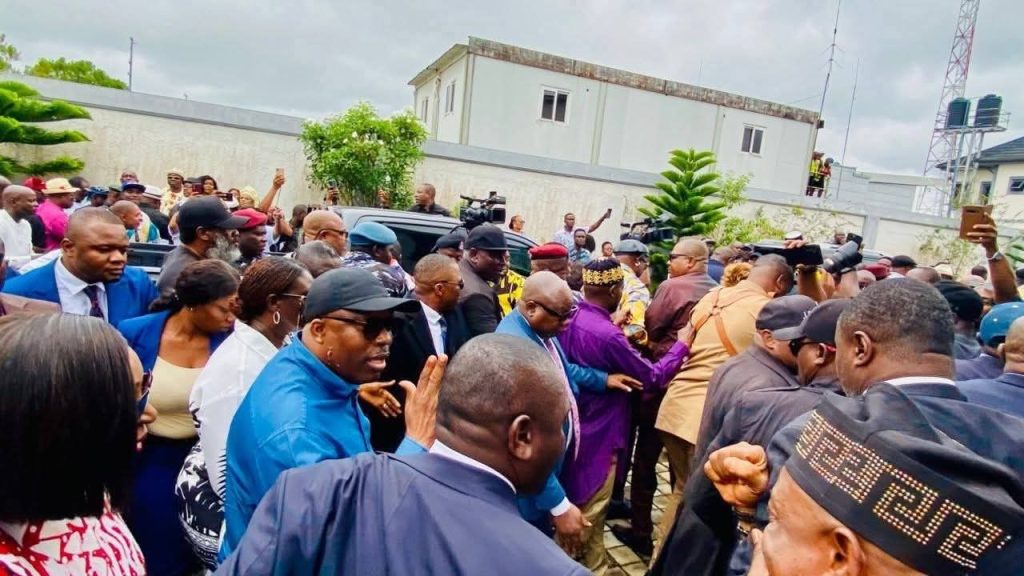Rivers State Governor, Siminalayi Fubara, has called on political leaders and citizens to embrace reconciliation and focus on development following the end of six months of emergency rule in the state.
Tension in Rivers heightened late last year after a power struggle erupted between Governor Fubara, the Minister Wike, and the Speaker of the State House of Assembly, Martin Amaewhule. The dispute led to the temporary suspension of the governor, his deputy, Ngozi Odu, and members of the House of Assembly.
In a statewide broadcast on Friday, Fubara said he deliberately chose not to challenge the legality of the emergency measures declared by President Bola Tinubu in March, despite the suspension of democratic institutions at the time.
“I resisted the pressure to question the constitutionality of the emergency rule, the suspension of democratic institutions, and other measures,” he stated.
Across Rivers, there is a strong sense of relief that the political turbulence has ended. For many residents, the return of democratic governance signals a chance to begin afresh.
Communities are hopeful that reconciliation among leaders will translate into visible improvements in their daily lives. From better roads and schools to stronger healthcare services, citizens say they are eager to see promises matched with action.
A large number of supporters had converged on the VIP wing of the Port Harcourt International Airport, Omagwa of the state, in anticipation of the arrival of Fubara on Friday.
Despite being reinstated by on President Bola Tinubu on Thursday, Fubara was not seen at the State Government House as supporters who had made their way there since 6 am were allegedly seen leaving the premises unhappy and frustrated.
Speaking on his unknown whereabout as of Thursday, the Minister of the Federal Capital Territory, Nyesom Wike, stated that there was no law indicating that the governor must resume the same day (Thursday) the emergency rule was lifted.
Tinubu had imposed emergency rule on March 18 amid a fierce political battle between Fubara and Nyesom Wike, minister of the Federal Capital Territory. The governor credited Tinubu with brokering peace among the state’s warring political camps, including the assembly.
“We believe the political crisis is now behind us and that peace and stability have once again returned to Rivers, though not without the hard lessons learnt from the emergency rule,” Fubara said.
He acknowledged public skepticism about the peace process but assured residents their fears were “valid and understood.”
“However, nothing has been irretrievably lost; there remains ample opportunity for necessary adjustments, continued reconciliation, and inclusiveness,” he added.
The governor urged lawmakers, political leaders, and stakeholders to set aside divisions and work together in the state’s interest.
“The costliest peace is cheaper than the cheapest war,” he remarked.
Fubara reaffirmed his gratitude to Tinubu, saying: “I will never take Mr President’s kindness for granted, and for that, I hereby reaffirm my utmost loyalty and eternal gratitude.”
He also thanked Rivers residents for their patience during the emergency, as well as religious leaders, traditional rulers, civil society, and political stakeholders for supporting peace.
Pledging to accelerate development, he said his administration would complete ongoing projects in infrastructure, education, healthcare, and other key sectors while working with the assembly to “recover lost ground.”
The governor further extended appreciation to Wike, Senate President Godswill Akpabio, Speaker of the House of Representatives Abbas Tajudeen, and members of the national assembly for their roles in resolving the crisis.
“Our diversity is our greatest asset, and our unity the strongest guarantee of our future,” Fubara said, urging Rivers people to move past bitterness and division.
Fubara urged to prepare budget, submit commissioner nominees
The Rivers State House of Assembly reconvened on Thursday, marking its first plenary since March, after .after the six-month emergency rule.
During the sitting, the lawmakers pressed for a review of financial transactions and contracts executed under the emergency administration, arguing that the legislature had neither seen nor contributed to the budget used during the period.
House Leader Hon. Major Jack, who moved the motion with eight other lawmakers including Deputy Leader Hon. Linda Somiari-Stewart, said while the emergency period delivered notable gains such as the August 30 local government elections that produced 23 chairmen and councillors it was important to establish transparency around how state funds were spent.
“Several contracts were awarded and funds expended from the Consolidated Revenue Account by the outgone Administrator. We must have a clear picture of what transpired and design a new financial plan that reflects the aspirations of Rivers people,” Jack said.
He also urged Fubara to send in a list of commissioner nominees to reconstitute the State Executive Council and to present a fresh appropriation bill for the remainder of the fiscal year, in line with the Constitution and the peace accord that restored democratic institutions in the state.
Speaker Rt. Hon. Martin Amaewhule announced that the Assembly would formally communicate these demands to the governor, after all 26 lawmakers present unanimously backed the motion through a voice vote.
Jack further commended President Bola Tinubu for lifting the emergency and reinstating democratic governance, assuring that the Assembly would respect the peace agreement and prioritize stability and good governance in the state.



